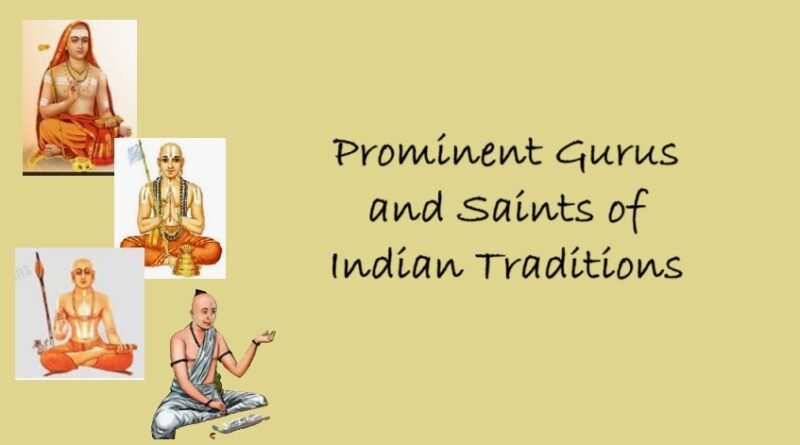Prominent Gurus and Saints of Indian Traditions
India has always been a land of spiritual awakening and philosophical thought. Across centuries, various gurus and saints have shaped the country’s religious, cultural, and ethical fabric. From Hinduism to Buddhism, Jainism to Sikhism, each faith tradition has been blessed with visionary teachers who offered timeless guidance to humanity.
In this article, we explore some of the most revered saints and spiritual leaders from different Indian religions and schools of thought.
Hinduism: Great Gurus and Thinkers
Adi Shankaracharya (788–820 CE)
The founder of Advaita Vedanta, Adi Shankaracharya was a spiritual genius who unified diverse Hindu traditions and revived Vedic philosophy. His commentaries on the Upanishads, Bhagavad Gita, and Brahmasutras remain foundational to Indian philosophy.
- 🛕 Established four mathas (monasteries) across India.
- 🔁 Advocated non-dualism (Advaita) – the idea that the self (Atman) and ultimate reality (Brahman) are one.
Ramanujacharya (1017–1137 CE)
A towering figure in Sri Vaishnavism, Ramanuja proposed the philosophy of Vishishtadvaita (qualified non-dualism). He emphasized bhakti (devotion) as the path to liberation and integrated spiritualism with social reform.
- 📚 Championed the equality of all beings in the eyes of God.
- 🕊️ Strong proponent of inclusive temple worship.
Madhvacharya (1238–1317 CE)
The founder of Dvaita Vedanta, Madhvacharya believed in the absolute distinction between the individual soul (jiva) and God (Vishnu). His dualistic approach formed the backbone of many Vaishnavite traditions.
- 🧠 Emphasized reason, logic, and a personal God.
- 📖 Authored commentaries on the Gita, Brahmasutras, and Upanishads.
Vallabhacharya (1479–1531 CE)
Founder of the Pushti Marg (Path of Grace), Vallabhacharya focused on divine love and the unconditional grace of Shri Krishna. He encouraged householders to pursue spiritual life without renouncing worldly duties.
- 🕉️ Worshipped Krishna in his child form (Baal Krishna).
- 🎶 Inspired many devotional poets and bhakti traditions.
Tulsidas (1497–1623 CE)
A saint-poet known for writing the Ramcharitmanas, a devotional retelling of the Ramayana in Awadhi. Tulsidas made the story of Lord Rama accessible to common people and inspired mass devotion.
- 🪔 Symbol of literary and spiritual devotion.
- 💬 Famous quote: “Bhaye pragat kripala deen dayala, Kaushalya hitkari…”
Surdas (1478–1581 CE)
Blind from childhood, Surdas composed soul-stirring bhajans in Braj language centered on Lord Krishna’s childhood. His verses remain widely sung across India.
- 🎵 One of the Navaratnas in Akbar’s court.
- 👁️ Devotion overcomes physical limitations.
Meerabai (1498–1547 CE)
A royal devotee of Krishna, Meerabai renounced palace life for spiritual union with her Ishta Devata (personal deity). Her devotional songs echo themes of surrender, longing, and divine love.
- 🎼 Her bhajans are still part of classical and folk repertoires.
- 🧘♀️ Considered a female mystic and rebel.
Chaitanya Mahaprabhu (1486–1534 CE)
Founder of Gaudiya Vaishnavism, Chaitanya propagated nama-sankirtana (chanting the holy name) as the easiest way to connect with the Divine in the Kali Yuga.
- 🔁 Considered an incarnation of Radha and Krishna.
- 💃 Promoted ecstatic dance and devotional singing.
Tailang Swami (1607–1887 CE)
Often referred to as the “Walking Shiva of Varanasi,” Tailang Swami was a revered yogi with reputed miraculous powers. His long life and intense spiritual discipline earned him divine status.
- 🧘 Practiced severe penance and meditation.
- 🔮 Said to have performed many supernatural feats.
Ramakrishna Paramhansa (1836–1886 CE)
A mystic saint who realized God through various paths—devotion, tantra, and even Islam and Christianity. His teachings were universal and laid the foundation for modern spiritual thought.
- 🧠 Mentor to Swami Vivekananda.
- 🌍 Preached unity of all religions.
Buddhism: Enlightened Teachers
Gautama Buddha (563–483 BCE)
The founder of Buddhism, Siddhartha Gautama attained enlightenment under the Bodhi tree and became Buddha—“The Awakened One.” His Four Noble Truths and Eightfold Path continue to guide millions.
- 🕊️ Emphasized compassion, mindfulness, and detachment.
- 🌳 Buddhism later spread to Asia and beyond.
Jainism: Tirthankaras and Spiritual Sages
Mahavir Swami (599–527 BCE)
The 24th and last Tirthankara of Jainism, Mahavir emphasized ahimsa (non-violence), truth, and self-control. He restructured Jain community life and spiritual discipline.
- 🧘♂️ Advocated strict asceticism.
- 📜 His teachings are recorded in the Agamas.
Sikhism: Gurus of Truth and Valor
Guru Nanak Dev Ji (1469–1539 CE)
Founder of Sikhism, Guru Nanak preached equality, devotion to one God, and selfless service (seva). His teachings were compiled in the Guru Granth Sahib.
- 🛕 Established Kartarpur and initiated spiritual dialogue.
- 🤝 Rejected caste, ritualism, and idol worship.
Guru Gobind Singh Ji (1666–1708 CE)
The 10th and last human Sikh Guru, Guru Gobind Singh institutionalized the Khalsa Panth—the community of saint-soldiers. He emphasized courage, discipline, and spiritual resilience.
- 🛡️ Declared Guru Granth Sahib as the eternal Guru.
- ✒️ Composed spiritual texts like the Dasam Granth.
Other Influential Saints
🔹 Guru Ravidas (1377–1527 CE)
A Bhakti movement saint who preached equality, harmony, and devotion. His poems are part of the Guru Granth Sahib.
🔹 Sant Kabir (1440–1518 CE)
A poet-saint and weaver by profession, Kabir emphasized nirguna bhakti (worship of formless God) and attacked ritualism and social orthodoxy.
🔹 Jhulelal
Revered by Sindhi Hindus, Jhulelal is the deity of water and a symbol of communal harmony. His Jayanti is observed as Cheti Chand, marking the Sindhi New Year.
✨ Conclusion
These gurus and saints have not only shaped India’s religious identity but also promoted philosophical depth, moral values, and social transformation. Their teachings cut across caste, class, and religion, offering universal guidance for inner peace and societal harmony.
📌 Follow Bharat Articles for more in-depth content on Indian philosophy, culture, saints, and sacred traditions.

